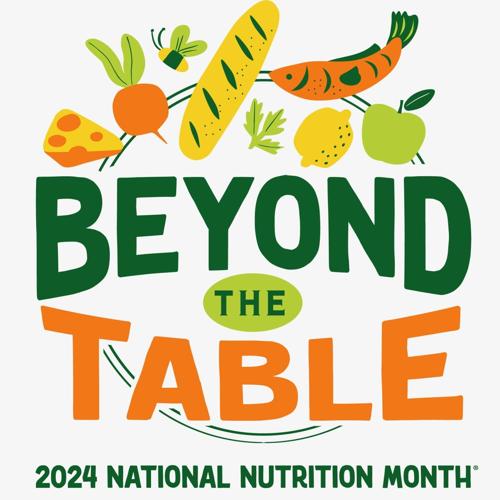A nutrition education and information campaign sponsored annually by the Academy of Nutrition and Dietetics, National Nutrition Month®, held annually in March, focuses on making informed food choices and developing sound eating and physical activity habits. This year’s theme is Beyond the Table, allowing me to share information on several nutrition-related topics.
I’ve heard many common misconceptions during my 45 years as a dietitian. Here are eight things that I wish more people realized.
You don’t only need to shop the grocery store’s perimeter for healthy food. Though store layouts vary, there are nutritious products in many interior aisles. Some things that make sense to stock in your pantry or freezer are often found in the center of the store, including broth, nuts, dried/canned/frozen fruit, canned and frozen vegetables, herbs, spices, extra virgin olive oil, whole grains like brown rice, farro, barley, oatmeal, quinoa, popcorn, canned meat and seafood, and some international foods.
Frozen vegetables are economical and convenient. One of the myths I hear often is that frozen vegetables are not nutritious. Blanching and freezing does decrease the amount of vitamin C in vegetables, but all other nutrients are locked in. The convenience and lack of waste should move these items to the top of your shopping list.
Kosher and sea salt don’t offer health benefits over table (iodized) salt. Kosher, sea salt and iodized table salt are all sodium chloride (NaCl); salt may vary in the size of its crystals and color (pink, gray, black, etc.), but salt is salt. If you are salt sensitive and it affects your blood pressure, changing from iodized salt to kosher or sea salt will not decrease your sodium intake nor improve your blood pressure; however, if the larger sea salt crystals cause you to use less, that can help you lower your sodium intake. Some salts may have slight mineral differences, but you’d need to consume an excessive amount to see any benefit.
Many adults take more vitamin and mineral or herbal supplements than they need. Americans who are part of the “pill culture” are keen on supplements, which may be an unnecessary expense and can often negatively interact with doctor-prescribed medications. Supplements are not regulated like prescription drugs and may not even contain the vitamins, minerals or herbs they claim to have. They also can be contaminated with heavy metals like lead.
Private label/store brands are a smart and economical choice. Private-label or store brands are often produced by the same companies that make major brand-name food products. You may save money by comparing your favorite name-brand product’s ingredients and nutrition facts label with the store brand in the same shelf space.
“Superfoods” is a marketing term, not a scientific one. Our bodies require a variety of vitamins, minerals and phytonutrients. These nutrients often interact, so the food matrix is more important than a high amount of two or three nutrients. The truth is that advertising and marketing companies apply a “superfood” label to increase sales.
Increase vegetable intake by thinking beyond salads and vegetable sides. Add a vegetable-rich snack to your day, like fresh veggies with dip, a smoothie with veggies and fruit, dehydrated carrots, beets or kale chips. Remember that veggies included in soups, stews and casseroles count toward the recommended six servings daily.
Processed foods aren’t all bad. “Processing” means taking foods from inedible to edible (cooking) or decreasing the risk of harm (pasteurizing). Coffee beans must be dried and roasted for brewed coffee. Grains must be ground and milled into flour for bread, pastries or pasta. Dry beans that are soaked, cooked and canned are processed. Foods cooked at home or in a restaurant are also processed. Instead of shunning all processed food, consumers should minimize ultra-formulated products with fractionated food, chemicals, flavors, and a level of salt, sugar and fat that makes them hyper-palatable.




